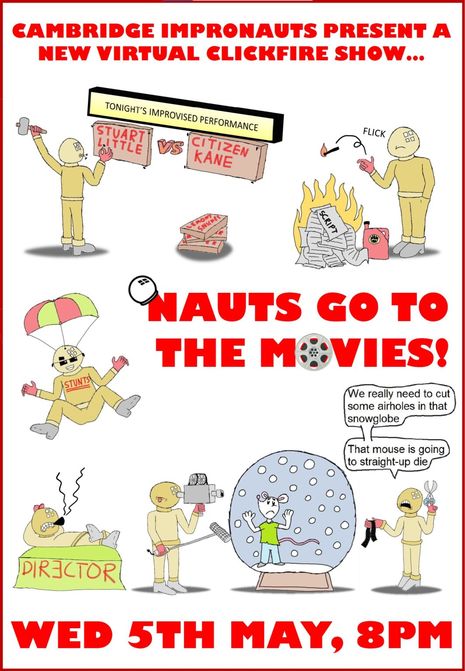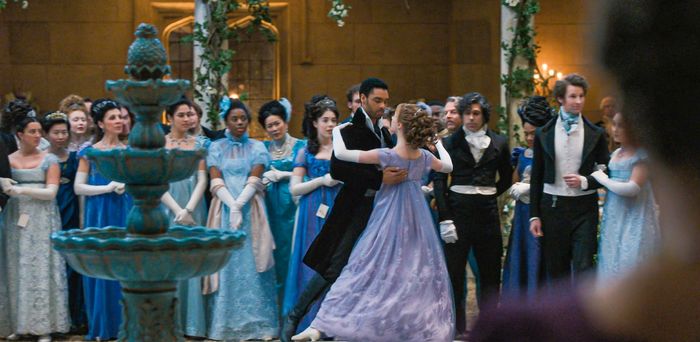‘Clickfire’ is a wild cinematic romp
Emma Robinson reviews the comic butchering of classic cinema in the Impronauts’ latest online offering

“Better to be a schmuck for a night than a king for a lifetime”—said Robert De Niro as Rupert Pupkin… in a film I can’t remember the name of… and he actually didn’t say that at all, he said the opposite, but… creative license and copyright, so…
Clickfire: Nauts Go to the Movies is a joyfully chaotic butchering of iconic films and cinema genres. The cast improvise around audience-given prompts, of locations, film titles or outlined plots, attempting to tie together the completely incompatible and create an amalgamation which is as indescribable and unrepeatable as Frankenstein’s monster.
“A chaotically fun butchering of movies which reaches ridiculously unique ends”
My favourite of all the games played during the Impronaut’s Clickfire was to spontaneously tell a story from a prompt, and then retell it and retell it and retell it, but with each retelling the amount of time they are given is halved. Eventually, a minute long story is crammed into seven seconds. Inevitably this leads to hilarious leaps within the story, until it becomes ridiculously disjointed. Although the audience knows the expositional story from which the fast-paced retelling has emerged, heard in isolation the fusion of unsuited words and ideas, from the seven second retelling, evoke some bizarre and pretty unsettling images. For example, if I shortened my initial summary of the show, it would be: “A chaotically fun butchering of movies which reaches ridiculously unique ends.”
And a further shortening would be: “Ridiculous butchery.” I dread to think what images spring to mind from those two words.
The time pressure in this game annihilates the last of the casts’ inhibitions. However, most advantageously, it prevents the ability for exposition and the inclination to establish foundations like setting or character within the sketches. Unfortunately, this was a rare consequence of this single game, and the rest of the performance suffered from a tendency to gravitate towards narrative details rather than allowing the sketches to be primarily dialogue driven. Ironically, while this performance relies so heavily on audience interaction, it felt at times as though the performers doubted the audience’s capacity to fill in, or suspend their disbelief over, the gaps within their sketches. At points, over-explaining led the performance to fall victim to the energy-sucking divide that is a computer screen.
The film genres they imitated varied from spaghetti western to angsty indie, mockumentary to true crime, the stylistic and tonal focus ensuring that there was a constant variation in the show. It also meant that the sketches were often leaning upon clichés, and therefore humorous exaggeration. Undoubtedly this was funny, and what the publicity and casts’ extreme costumes led the audience to expect. However, improv is a diverse theatrical genre, which has the potential for more suspense or dark humour or intellectualism, and perhaps the major reliance on bizarreness makes improv itself seem as bound by tropes as the cliché film genres they caricatured.
Much like this review, the performance was bitty. It moved from game to game, eschewing a larger trajectory, so there was a difficulty to conclude with a sense of satisfaction. However, the necessity to end with something that could tie the rest of the performance together wasn’t overlooked, and therefore they created a competition. The live audience could vote for their favourite improviser from the evening. This invited the audience to reflect back on the show and so summarise and unify it themselves, within their own minds, supplying what the structure of the performance couldn’t achieve itself.
Ultimately, the cast likely enjoyed themselves as much, if not more, than the audience. However, that’s because improv is fun. And the audience can live vicariously through their care-free happiness, absorb their energy and maybe even reflect upon how the perpetuated attitude of self-consciousness — which Zoom is allowing to thrive in all of us — can be joyously shed.
 News / Caius mourns its tree-mendous loss23 December 2025
News / Caius mourns its tree-mendous loss23 December 2025 News / Clare Hall spent over £500k opposing busway 24 December 2025
News / Clare Hall spent over £500k opposing busway 24 December 2025 Comment / Yes, I’m brown – but I have more important things to say22 December 2025
Comment / Yes, I’m brown – but I have more important things to say22 December 2025 Comment / The ‘class’ of Cambridge24 December 2025
Comment / The ‘class’ of Cambridge24 December 2025 Interviews / Politics, your own way: Tilly Middlehurst on speaking out21 December 2025
Interviews / Politics, your own way: Tilly Middlehurst on speaking out21 December 2025








